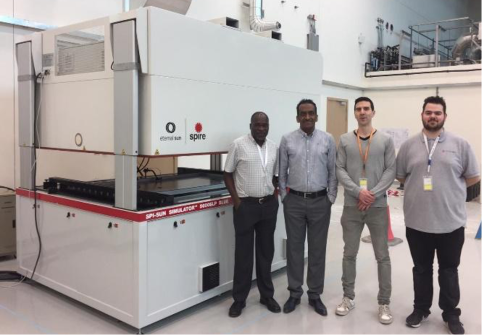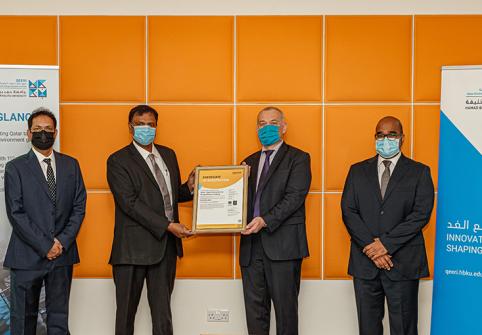Innovation Qatar Environment and Energy Research Institute at HBKU Develops New Technology to Remove Oil from Seawater
New filtration technique promises more efficient oil/water separation process
Scientists at the Qatar Environment and Energy Research Institute (QEERI) at Hamad Bin Khalifa University (HBKU) have developed a new type of filtration technology which can remove small oil droplets from seawater. The filtration technology features a new type of membrane which has unique chemical and physical properties, making it more efficient and fouling resistant during the oil/water separation process. The technology and membrane were developed by QEERI’s Water Center with support from the Computational-Materials & Processes Center.
Seawater desalination is the main water source in Qatar and provides up to 99 percent of potable water needs while supporting a broad range of commercial, industrial and agricultural activities. Although thermal desalination is extensively used, Qatar is slowly moving towards the construction of more energy-efficient reverse osmosis (RO) membrane desalination plants. However, desalination facilities, especially RO membranes, are vulnerable to oil contamination in seawater.
The common strategies for oil spill response include spraying chemicals on the seawater surface to disperse oil slicks, and deploying floating booms to contain and collect oil. However, these practices stop short of preventing small oil droplets seeping into the seawater intake ports of desalination plants and causing damage or shutdown.
Dr. Jenny Lawler, senior research director at the Water Center at QEERI, said: “Oil spill threats are a matter of concern all across the Gulf, as these could potentially cause a complete shutdown of some desalination facilities, which could in turn affect the availability of clean drinking water for Qatar’s population. Accordingly, the development and deployment of mitigation strategies to prevent such catastrophic interruption of seawater desalination from oil contamination is vital to the State of Qatar. Our team at QEERI is actively involved in developing the science and technological solutions to make the desalination process efficient and effective.”
In line with Qatar National Vision 2030, QEERI’s Water Center conducts research in water resources, water desalination, wastewater treatment and reuse. Dr. Marc Vermeersch, executive director at QEERI, said: “At QEERI, our primary objective is to help Qatar tackle its grand challenges in energy, water and environment, and we do this through cutting-edge research, development and innovation. Providing customized technological solutions for issues facing Qatar is a top priority.”
QEERI’s Water Center Oil and Water Separation Team of accomplished researchers includes Eng. Radee Al Rewailly, Dr. Jayaprakash Saththasivam, Dr. Oluwaseun Ogunbiyi and Dr. Zhaoyang Liu. The team performs design, experimental and modeling studies with support from Dr. Said Ahzi from the Computational-Materials & Processes Center. Their focus is on the development of novel materials, components and processes for the mitigation of oil fouling in various industries, including municipal drinking water production and the oil and gas sectors.
As a culmination of a number of years of continued research and development, the team has also filed multiple patents for oil/water separation technology, which cover key markets including the United States, China, the European Union and the Middle East. Their most recent research output has just been published in the Journal of Environmental Science and Pollution Research. The paper ‘Efficient Oil/Saltwater Separation Using a Highly Permeable and Fouling-resistant All-Inorganic Nanocomposite Membrane’, is based on Eng. Rand Elshorafa’s PhD research work and her experimental studies at QEERI.
For more information on the work of QEERI, please visit qeeri.hbku.edu.qa.




